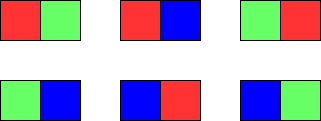Problem
You are given two integers m and n. Consider an m x n grid where each cell is initially white. You can paint each cell red, green, or blue. All cells must be painted.
Return** the number of ways to color the grid with no two adjacent cells having the same color**. Since the answer can be very large, return it *modulo* 10^9 + 7.
Example 1:

Input: m = 1, n = 1
Output: 3
Explanation: The three possible colorings are shown in the image above.
Example 2:

Input: m = 1, n = 2
Output: 6
Explanation: The six possible colorings are shown in the image above.
Example 3:
Input: m = 5, n = 5
Output: 580986
Constraints:
1 <= m <= 51 <= n <= 1000
Solution
class Solution {
public static final int P = 1_000_000_007;
public int colorTheGrid(int m, int n) {
if (m == 1) {
return (int) (3L * powMod(2, n - 1) % P);
}
if (m == 2) {
return (int) (6L * powMod(3, n - 1) % P);
}
if (n == 1) {
return (int) (3L * powMod(2, m - 1) % P);
}
if (n == 2) {
return (int) (6L * powMod(3, m - 1) % P);
}
int totalTemplates = 1 << (m - 2);
int totalPaintings = binPow(3, m);
int[] paintingToTemplate = new int[totalPaintings];
long[] paintingCountForTemplate = new long[totalTemplates];
long[][] templateEdgeCount = new long[totalTemplates][totalTemplates];
Map<Integer, Integer> templateToIndex = new HashMap<>(1 << (m - 2));
int templateCounter = 0;
for (int i = 0; i < totalPaintings; i++) {
int type = getType(i, m);
if (type == -1) {
paintingToTemplate[i] = -1;
continue;
}
Integer templateIndex = templateToIndex.get(type);
if (templateIndex == null) {
templateToIndex.put(type, templateCounter);
templateIndex = templateCounter++;
}
paintingToTemplate[i] = templateIndex;
paintingCountForTemplate[templateIndex]++;
}
for (int i = 0; i < totalPaintings; i++) {
if (paintingToTemplate[i] == -1) {
continue;
}
for (int j = i + 1; j < totalPaintings; j++) {
if (paintingToTemplate[j] == -1) {
continue;
}
if (checkAllowance(i, j, m)) {
templateEdgeCount[paintingToTemplate[i]][paintingToTemplate[j]]++;
templateEdgeCount[paintingToTemplate[j]][paintingToTemplate[i]]++;
}
}
}
for (int i = 0; i < totalTemplates; i++) {
long c = paintingCountForTemplate[i];
for (int j = 0; j < totalTemplates; j++) {
templateEdgeCount[i][j] /= c;
}
}
long[][] matrixPower = matrixPower(templateEdgeCount, (long) n - 1);
long ans = 0;
for (int i = 0; i < totalTemplates; i++) {
long s = 0;
long[] arr = matrixPower[i];
for (long a : arr) {
s += a;
}
ans += paintingCountForTemplate[i] * s;
}
return (int) (ans % P);
}
private static boolean checkAllowance(int a, int b, int m) {
for (int i = 0; i < m; i++) {
if (a % 3 == b % 3) {
return false;
}
a /= 3;
b /= 3;
}
return true;
}
private static int getType(int a, int m) {
int[] digits = new int[3];
int first = a % 3;
int second = a % 9 / 3;
if (first == second) {
return -1;
}
digits[second] = 1;
digits[3 - first - second] = 2;
int prev = second;
int type = 1;
m -= 2;
a /= 9;
while (m-- > 0) {
int curr = a % 3;
if (prev == curr) {
return -1;
}
type = type * 3 + digits[curr];
prev = curr;
a /= 3;
}
return type;
}
private static int powMod(int a, int b) {
long res = 1;
while (b != 0) {
if ((b & 1) != 0) {
res = (res * a) % P;
--b;
} else {
a = (int) (((long) a * a) % P);
b >>= 1;
}
}
return (int) res;
}
private static int binPow(int a, int n) {
int res = 1;
int tmp = a;
while (n != 0) {
if ((n & 1) != 0) {
res *= tmp;
}
tmp *= tmp;
n >>= 1;
}
return res;
}
private static long[][] matrixPower(long[][] base, long pow) {
int n = base.length;
long[][] res = new long[n][n];
for (int i = 0; i < n; i++) {
res[i][i] = 1;
}
while (pow != 0) {
if ((pow & 1) != 0) {
res = multiplyMatrix(res, base);
--pow;
} else {
base = multiplyMatrix(base, base);
pow >>= 1;
}
}
return res;
}
private static long[][] multiplyMatrix(long[][] a, long[][] b) {
int n = a.length;
long[][] ans = new long[n][n];
for (int i = 0; i < n; i++) {
for (int j = 0; j < n; j++) {
for (int k = 0; k < n; k++) {
ans[i][j] += a[i][k] * b[k][j];
}
ans[i][j] %= P;
}
}
return ans;
}
}
Explain:
nope.
Complexity:
- Time complexity : O(n).
- Space complexity : O(n).